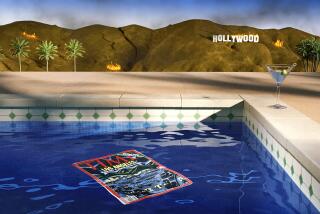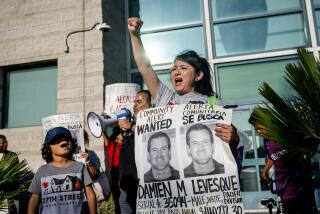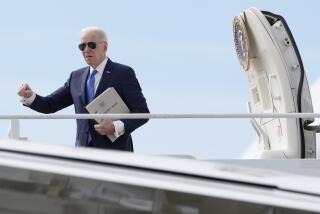KING CASE AFTERMATH: A CITY IN CRISIS : Bush Pledges Enough Force to Quell Riots
WASHINGTON — Committing 4,500 federal troops to immediate duty on the streets of Los Angeles, President Bush vowed Friday night to use “whatever force is necessary to restore order” if violence flares anew.
The surprise action was bolstered by a separate presidential order to place nearly 6,000 National Guard forces under federal control to help restore order to the ravaged city.
“What is going on in L.A. must and will stop,” Bush pledged in a prime-time, nationally televised address. “As your President, I guarantee you: This violence will end.”
Bush had made the decision earlier Friday to send the troops to Los Angeles on a standby basis, but a decision on whether to deploy them was not expected until today. White House officials said Bush made the decision Friday night, however, only moments before delivering his speech, and after speaking by telephone with Gov. Pete Wilson and Mayor Tom Bradley. They said both Wilson and Bradley had requested the federal intervention.
“They indicated that they would like to have a major show of force on the streets tonight to try to bring the situation under control,” a senior Administration official said during a late-night White House briefing.
In the address, Bush also announced that a federal grand jury already has issued subpoenas as part of the accelerated Justice Department investigation into whether the beating of Rodney G. King violated U.S. civil rights statutes.
The unusual presidential disclosure was described by White House aides as an attempt by Bush to soothe the destructive anger sparked by the acquittal of four Los Angeles police officers in the case.
But despite what were intended as reassuring words, Bush left no doubt of his determination to maintain a rigid stance in the face of riots that have presented him with perhaps his most trying domestic crisis.
Bush said the commitment of the joint task force of 1,500 Marines from Camp Pendleton and 3,000 soldiers from Ft. Ord would “help restore order” amid continuing “incidents of random terror and lawlessness.”
The federal force is to be assisted by 1,000 federal agents, including FBI SWAT teams, U.S. marshals and special border patrol units, who were dispatched to Los Angeles Friday morning.
The agents were put into service immediately, but Bush said Friday night that their numbers could be supplemented by an additional 1,000 agents he put on standby alert.
Under arrangements imposed in an order signed by Bush, the new military force is to be commanded by Maj. Gen. Marvin L. Covault, commander of the Ft. Ord-based 7th Infantry Division. Because of the domestic nature of the duty, the two-star general is to report directly to U.S. Atty. Gen. William P. Barr or his designate, Assistant Atty. Gen. Robert S. Mueller.
A senior Administration official said the Army and Marine infantry forces would be armed with rifles and other light weapons and would operate under rules of engagement authorizing them to “return fire if fired upon.”
White House spokesman Marlin Fitzwater had said earlier in the day that federal forces would be employed only if state and local efforts to control the situation were “exhausted.” An Administration official would say only Friday night that the White House now expected all such units to be used.
U.S. officials said actual decisions about how the soldiers and Marines should be employed Friday night would be left to tactical commanders. But a senior Administration official said the commanders had been instructed to establish a show of force.
“The forces will be on the streets or moving into the streets tonight,” the official said. The units had been ordered to Los Angeles earlier Friday but had been expected to remain in a staging area.
Because of prohibitions against the use of the military in domestic law enforcement, officials said it was unlikely that the troops would be given arrest authority. Instead, they were expected to establish secure cordons from which police officers could operate.
The Oval Office address was Bush’s first to the nation since the collapse of the Soviet Union late last year. Apart from a 1989 speech about the dangers of drugs, it was the first time he had chosen the portentous setting to dramatize his concern over a domestic issue.
In outlining his response to the violence some 48 hours after it began, Bush for the most part followed a pattern in which he has blended stern law-and-order rhetoric with a broader appeal for mutual tolerance and respect.
Midway through the speech, he recounted the moving story, reported in Friday’s Los Angeles Times, of a “savagely beaten white truck driver, alive tonight because four strangers--four black strangers--came to his aid.”
“Together, those four people braved the mob and drove that truck driver to the hospital,” the President said. “It is for every one of them that we must rebuild the community of Los Angeles, for these four people and the others like them, who, in the midst of this nightmare, acted with simple human decency.”
After spending two emotional hours meeting with prominent black leaders earlier in the day, the President also took pains in his remarks to acknowledge the deep mistrust with which many African-Americans regard the nation’s judicial system.
“For 14 months, they waited, patiently, hopefully,” he said. “And when the verdict came in, they felt betrayed.
In going out of his way to announce the progress being made in the federal investigation of the King case, aides said, the President sought to answer demands made to him by the black leaders that he put forward a symbol of his determination to see justice done.
On a long day in which Bush also met with senior legal and national security advisers, the session with black leaders underscored what for the President remains a larger dilemma.
Participants said the leaders agreed with Bush that the first priority was to put an end to the disorder. But they also sounded not-so-subtle criticisms of his presidency as they told him he must do more to improve race relations.
“Unless we deal with this issue, America is in for a long, hot summer ahead,” Benjamin Hooks, executive director of the National Assn. for the Advancement of Colored People, told reporters after the meeting.
“When your leaders have nothing to offer, nothing to say, when the rug is pulled from underneath your feet, the people who normally would listen won’t,” complained the Rev. E. V. Hill, pastor of the Mount Zion Baptist church in South-Central Los Angeles.
In a response to such concern, Bush not only expressed understanding for black Americans who feel disenchanted, but also urged that Americans work to mend racial tensions once the disturbances are quelled.
With the federal investigation into the King case incomplete, he remained unable to promise that the Los Angeles police officers would again be forced to stand trial. But he sounded by far his strongest note of empathy to date for those outraged by the verdict issued by the Simi Valley jury in the videotaped beating case.
“Viewed from outside the trial, it was hard to understand how the verdict could possibly square with the video,” Bush said.
He said that civil rights leaders with whom he met Friday “were stunned. And so was I. And so was Barbara and so were my kids.”
But he sought to reassure Americans that “the verdict Wednesday was not the end of the process.” He portrayed the subpoenas newly issued by the Los Angeles grand jury as the result of his order to the Justice Department “to move into high gear on its own independent criminal investigation into the case.”
The call-up of federal troops for domestic law enforcement duty was one of the first since 1972, except in response to natural disasters. The 1972 call-up dispatched members of the 82nd Airborne Division to Washington to quell urban violence.
But the contingent of 4,500 soldiers and Marines moving into position in Los Angeles remains small compared with the 26,500 troops dispatched to major cities across the country in April, 1968, when rioting erupted after the assassination of the Rev. Martin Luther King Jr.
White House and Pentagon officials said details of the reinforcement were drawn up in the pre-dawn hours before a 7:15 a.m. session at the White House in which Bush met with Gen. Colin L. Powell, chairman of the Joint Chiefs of Staff, Atty. Gen. Barr and other senior officials.
Bush and his chief of staff, Samuel K. Skinner, had spoken overnight to Wilson, who requested federal assistance to restore order in Los Angeles. After a flurry of late-night phone calls between Skinner, Bush and National Security Adviser Brent Scowcroft, Powell was awakened at 4 a.m. at his quarters at Ft. Myers, Va., by a call from the National Military Command Center telling him that the White House was considering the use of active-duty troops.
At the meeting, Powell told Bush that the best equipped and most accessible troops for the job were the Ready Brigade of the 7th Infantry, based at Ft. Ord, and a battalion of Marines from the 1st Marine Expeditionary Force, based at Camp Pendleton. Bush ordered Powell to deploy the troops to staging areas near the riot zone by the end of the day.
The troops of the 7th Infantry had fought in Panama in December, 1990; the Marines are Desert Storm veterans. The lightly equipped Army troops deployed with only their personal weapons--M-16 rifles for the infantry and automatic pistols for the Military Police--and a variety of small trucks and jeeps known as Humvees. The Marines transported 17 light armored vehicles, small personnel carriers armed with machine guns, to riot duty in Los Angeles, officials said.
More to Read
Sign up for Essential California
The most important California stories and recommendations in your inbox every morning.
You may occasionally receive promotional content from the Los Angeles Times.










